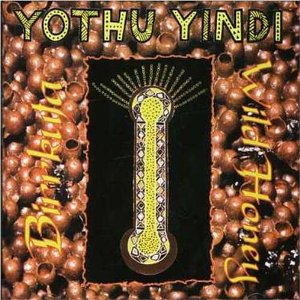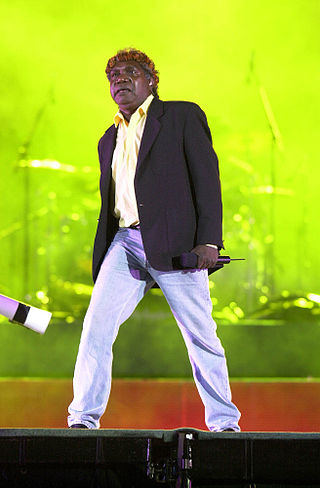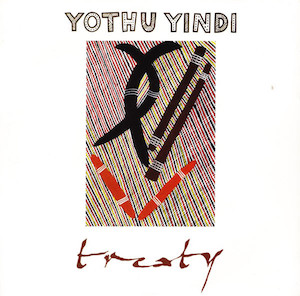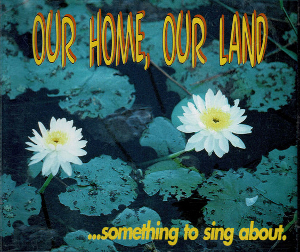Related Research Articles

Yothu Yindi are an Australian musical group with Aboriginal and non-Aboriginal members, formed in 1986 as a merger of two bands formed in 1985 – a white rock group called the Swamp Jockeys, and an unnamed Aboriginal folk group consisting of Mandawuy Yunupingu, Witiyana Marika, and Milkayngu Mununggur. The Aboriginal members came from Yolngu homelands near Yirrkala on the Gove Peninsula in Northern Territory's Arnhem Land. Founding members included Stuart Kellaway on bass guitar, Cal Williams on lead guitar, Andrew Belletty on drums, Witiyana Marika on manikay, bilma and dance, Milkayngu Mununggurr on yidaki, Geoffrey Gurrumul Yunupingu on keyboards, guitar, and percussion, past lead singer Mandawuy Yunupingu and present Yirrnga Yunupingu on vocals and guitar.

Homeland Movement is the debut studio album by Australian rock band Yothu Yindi that was released in April 1989 on the Mushroom Records label. The album peaked at number 59 on the ARIA Chart in 1992.

Tribal Voice is the second studio album by Yothu Yindi, released in September 1991 on the Mushroom Records label. The album peaked at number 4 on the ARIA Charts and was certified 2× Platinum.

Freedom is the third studio album by Australian band, Yothu Yindi released in 1993. The album peaked at number 31 on the ARIA charts.

Birrkuta – Wild Honey is the fourth studio album by Australian band, Yothu Yindi. It was released in November 1996 via Mushroom Records. It was co-produced by Lamar Lowder and Andrew Farriss.
Indigenous or Aboriginal rock is a style of music which mixes rock music with the instrumentation and singing styles of Indigenous peoples. Two countries with prominent Aboriginal rock scenes are Australia and Canada.

Garma is the sixth and final studio album by Australian band, Yothu Yindi that was released in August 2000 via Mushroom Records. The album peaked at number 66 on the ARIA Charts.

Mandawuy Djarrtjuntjun Yunupingu, formerly Tom Djambayang Bakamana Yunupingu, and also known as Dr Yunupingu, was a teacher and musician, and frontman of the Aboriginal rock group Yothu Yindi from 1986. He was an Aboriginal Australian man of the Yolŋu people, with a skin name of Gudjuk.

Indigenous music of Australia comprises the music of the Aboriginal and Torres Strait Islander peoples of Australia, intersecting with their cultural and ceremonial observances, through the millennia of their individual and collective histories to the present day. The traditional forms include many aspects of performance and musical instrumentation that are unique to particular regions or Aboriginal Australian groups; and some elements of musical tradition are common or widespread through much of the Australian continent, and even beyond. The music of the Torres Strait Islanders is related to that of adjacent parts of New Guinea. Music is a vital part of Indigenous Australians' cultural maintenance.

Galarrwuy Yunupingu, also known as James Galarrwuy Yunupingu and Dr Yunupingu, was an Indigenous Australian activist who was a leader in the Aboriginal Australian community. He was involved in Indigenous land rights throughout his career. He was a Yolngu man of the Gumatj clan, from Arnhem Land in the Northern Territory. He was the 1978 Australian of the Year.
Nabarlek are an Indigenous Roots band from Manmoyi, a tiny community in Arnhem Land, 215 kilometres from the remote community of Gunbalanya. The band formed in 1985 as a group of singers and dancers with a couple of busted guitars and flour tins for drums. The members are Bininj and they sing in the Kunwinjku language and in English, trying to reach across the cultures and to pass their knowledge from one generation to another. Their songs are traditional songs of the Kunwinjku people of western Arnhem Land with a rock/reggae arrangement. They call themselves the garage band that never had a garage.
Saltwater Band are an Indigenous roots band from Galiwin'ku on Elcho Island, around 560 kilometres from Darwin. The members are Yolngu and they sing mostly in Yolngu languages. Their songs are a mixture of traditional songs and reggae/ska influenced pop. One member of the band, the late Geoffrey Gurrumul Yunupingu, is a close relative of Mandawuy Yunupingu of Yothu Yindi and was a past member of Yothu Yindi.

"Treaty" is a protest song by Australian musical group Yothu Yindi, which is made up of Aboriginal and balanda (non-Aboriginal) members. Released in June 1991, "Treaty" was the first song by a predominantly Aboriginal band to chart in Australia and was the first song partly in any Aboriginal Australian language to gain extensive international recognition, peaking at No. 6 on the Billboard Hot Dance Club Play singles charts. The song contains lyrics in Gumatj, one of the Yolngu Matha dialects and a language of the Yolngu people of Arnhem Land in northern Australia.
The 26th Annual Australian Recording Industry Association Music Awards were a series of award ceremonies which included the 2012 ARIA Artisan Awards, ARIA Hall of Fame Awards, ARIA Fine Arts Awards and ARIA Awards. The latter ceremony took place on 29 November at the Sydney Entertainment Centre, and was telecast on Nine Network's channel Go! at 7:30pm. The final nominees for ARIA Award categories were announced on 3 October as well as nominees and winners for Fine Arts Awards and Artisan Awards. There was no peer judged "Single of the Year" category this year due to replacing it to "Song of the Year", although the "Album of the Year" category returned. The Highest Selling Single and Album categories were removed as they were in 2010.
East Journey are a rock/reggae band from North East Arnhem Land, Northern Territory. They combined modern and traditional music and sing in both English and Yolŋu.

Our Home, Our Land is a compilation album released in Australia by CAAMA in 1995. It was released to celebrate the victory in the Mabo case. It focused on the importance of land to the Aboriginal and Torres Strait Islander beliefs. It was nominated for a 1996 ARIA Award for Best Indigenous Release.

From the Bush is a compilation album of Australian Indigenous bands released in Australia by CAAMA in 1990. It was nominated for a 1991 ARIA Award for Best Indigenous Release.
Witiyana Marika is an Aboriginal Australian musician, filmmaker and elder, known for being a founding member of the band Yothu Yindi and producer of the film High Ground.
Banula (David) Marika is an Aboriginal Australian dancer, actor, singer and performer from Yirrkala in North East Arnhem Land, in the Northern Territory of Australia. The son of Roy Marika, he is a member of the Rirratjingu clan of the Yolngu people, and is known for his performances with the Bangarra Dance Theatre since the 1990s.
References
- ↑ Dorian, Frederick; Simon Broughton; Mark Ellingham; Orla Duane; Rough Guides; Richard Trillo (1999). "Australia: Blek Bala Mujik". World Music: The Rough Guide. Rough Guides. pp. 14–15. ISBN 978-1-85828-636-5.
- 1 2 3 4 5 McFarlane, Ian (1999). "Encyclopedia entry for 'Blekbala Mujik'". Encyclopedia of Australian Rock and Pop . St Leonards, NSW: Allen & Unwin. ISBN 1-86508-072-1. Archived from the original on 28 August 2004.
- 1 2 3 4 5 Korff, Jens. "Blekbala Mujik – Discography". Creative Spirits. Archived from the original on 15 December 2014. Retrieved 3 May 2017.
- ↑ "Winners by Year 1996". Australian Recording Industry Association (ARIA). Archived from the original on 14 December 2007. Retrieved 3 May 2017.
- ↑ Aria Awards Archived May 19, 2011, at the Wayback Machine , Blek Bala Mujiks award history